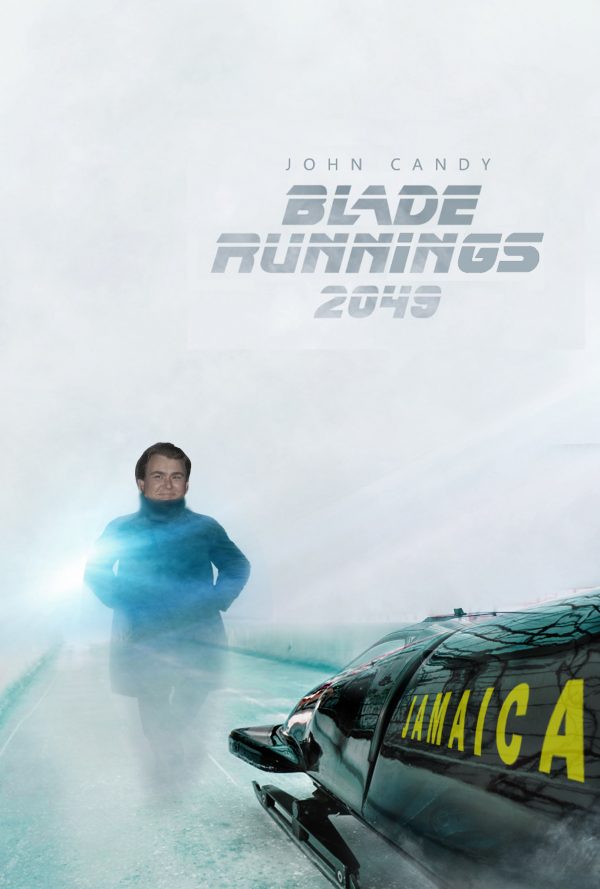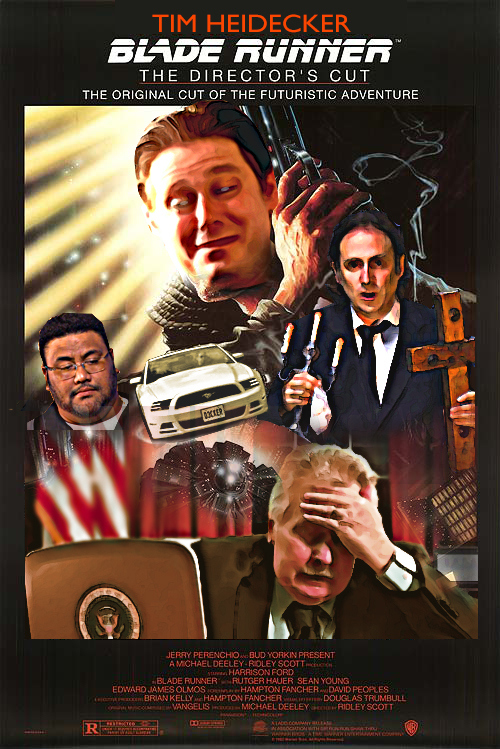(This is a repost of an article written for Lalalander.com)
(Brace yourself, this is going to get weird)
Blade Runnings 2049, a Disney production starring digitally resurrected John Candy and (careerily resurrected) Douglas E. Douglas as coaches for a misfit replicant bobsled team from Jamaica competing in the 2050 Olympic trials, will grace theaters this October. Our old favorites are back, but this time Sanka Coffie and Irv are joined by a rambunctious cast of robotic teenagers eager to win gold (and longer lives from their sponsor – Tyrell Corporation) in the e-bobsled circuit at the winter games in Tannhauser Germany before their four years of life up. All to a soundtrack of uplifting songs about teamwork and hard work written by Lin-Manuel Miranda that will have you dancing like C-beams off Orion.
(I mean if we’re only going to do remakes from here on out, why not have some fun?)
(wait, neither Blade Runner nor Cool Runnings were “fun,” let me rethink this…)
Rebooting primary sarcasm circuits . . .
Sadly, Blade Runnings won’t debut in October. But Blade Runner 2049 will! A film in which we’ll finally learn Rick Deckard really is a replicant. But not just Rick; the entire human race is a failed strain of replicants introduced by a more powerful creator. Tyler Tyrell the Creator killed Jesus because he was an advanced replicant prototype that proved too powerful to control. There’s a reason Tyrell operates out of a ziggurat; they’ve been refining their business model for thousands of years. The Aztecs. The Egyptians. The Mayans. The Stupids. All replicants. All failures. Until now. In 2049 Tyrell finally arrives at perfection, spelling doom (or paradise, depending on what market tests show we should name the film) for humanity. Only old grumpy Deckard and a naive but curious young Mouseketeer can stop 30 Seconds to Mars from performing at a stadium near you!
Or at least that’s how Blade Runner 2049 would have been if Ridley Scott directed it and took a chainsaw to another beloved mythos he helped create.
Legitimate (whatever that means) sci-fi fans hold Ridley Scott’s Blade Runner in much higher regard than his “slasher in space” or the bumbling fantasy with unicorns that somehow got recycled into Deckard’s dreams. Given the critical reception of his last two returns to the Alien universe, Warner Brothers decided to pull back on the old-man’s creative reigns that Fox carelessly threw to the wind dreaming of sweet sweet nerd dollars.
So WB isn’t letting Ridley direct this one, but we’re still talking about the shadow he surely cast on the production (Scott Free, his company, is co-producing the film). Scott’s statements to the press have already calmed or enraged the Runner truebloods, depending on which camp they’re in.
Camp Human Deckard, represented by the Red Letter Media’s of the world insists it’s ridiculous and insulting for Deckard to be a replicant. They aren’t without valid reasons: Dick’s original story and Fancher & Peoples’ (god, doesn’t that sound like a lawfirm?) script did not feature a replicant runner, and several scenes in the film no longer make sense if he is: Deckard’s weakness on the rooftop fight, his aging, etc.
If Camp Human wants reasons to be worried about Runner 2049, take careful notice of the writers of the new script. Peoples has been replaced by Michael Green, who included franchise killing plot elements in his Alien:Covenant script. Or maybe it was one of the other three men that meddled that story to death through three different titles and god knows how many rewrites to end up with (spoiler alert) another alien getting blown out of a spaceship airlock and another canonical inconsistency (no, David didn’t invent the aliens, unless he also invented time travel, and for Christ’s sake -the space jockey was never supposed to be Jesus!).
But without a replicant Deckard we have no twist. No reveal. No pathos. No pondering the meaning of life or humanity. Deckard’s inhumanity would mean more for his character than any of the other replicants. His conversation with Racheal and Eldon about her memories has no bite if he’s a bitter old human man. What do we learn from a human Deckard? Bring backup when confronting artificial intelligence? Don’t fall in love with a computer?
If Deckard is human Blade Runner is too simple a plot. The good guy wins. Humans win. You know why Terminator was a popular movie? Because it started with the premise that humans already lost. Then Terminator 2 showed us it was our own fault. Films that play to our vulnerability intrigue us. Deckard can get beaten by nearly invincible replicants and only break a few fingers. If he’s human he’s another Rambo, not a thinking man’s hero. These people that long for Deckard to be human are the same folks that try to find ways to make Malcolm Crowe in the Sixth Sense not dead. Everything must be simple and obvious. Where’s the fun in that?
(Michael Bay would argue four billion dollars in worldwide gross proves movies with happy endings that don’t require thinking seem to satisfy enough humans)
But Camp Replicant Deckard has its own set of problems. Do replicants recognize other replicants? They should. But they’d be able to recognize themselves if that were the case and Rachael (and Deckard) didn’t. But Roy showed he could recognize himself and other replicants. His saving of Deckard’s life might have been intended to send a message more profound than “hey, replicants have feelings too, you human jerk!” Eldon informs Deckard that Rachael’s inability to conceive of herself as a replicant is a feature her updated programming. This opens the door for Deckard as well. And any character presuming themselves a human being.
It’s exciting to imagine that Roy knew Deckard was a replicant the whole time. Roy eventually realized he had more freedom than a replicant Deckard ever would. Why else talk about the things he’d seen? It wasn’t in contrast to human experience when he said “you people.” After all, humans surely can see C-beams and go to the Tannhauser Gate, but Blade Runners like Deckard can’t. Roy isn’t ashamed of what he is. Deckard would be if he knew.
Roy may have taken pity on Deckard for this reason. Yet Roy kills humans like J.F. and Eldon with little or no remorse. Are we to believe that his sudden empathy toward Deckard is due to a newfound humanity, or is this just the end of a long game he’s playing with the only replicant he’s ever met that may hold the key to lengthening his life? After all, if Deckard is a replicant he’s the only one to live more than four years (assuming he wasn’t birthed to look that old).
Roy saves Deckard’s life so the secret of replicant aging is not lost like so those tears in the rain. Somewhere in Deckard’s memory is the key to defeating the four year age limit. Roy will not be the last to attempt to wring it from Deckard. Perhaps this is why the trailers for Blade Runner 2049 emphasize that Deckard needs to keep running from forces pursuing him. This makes a more entertaining yarn than Tyrell just wanting to shut him up about a replicant he met thirty years ago that could write poetry about outer space construction projects.
A replicant killed Eldon Tyrell, and a replicant (likely Jared Leto) took his place. But Eldon’s secret to replicant immortality died with him unless someone can find Deckard (and probably Rachael, but we don’t know if Sean Young has a cameo yet amid swirling rumors). Thus Jared’s state of not having enough time. It’s a literal statement. He’ll be dead and replaced in a few years if he can’t find Deckard. In that way 2049 might be an unfortunate retread of similar material (a replicant searching for longer life and making trouble along the way).
But proving Deckard is human is easier than all those words up there. At the beginning of the film Deckard proclaims “I’m retired,” proving he’s not human. Humans retire to Florida, not Los Angeles.
If you need any more help making up your mind try Quora. Scott has promised the new film will answer this question one way or the other, making one Camp very unhappy. The marketing suggests Gosling’s character is another blade runner. Which suggests replicants are still trying to win their independence. In the life of a human thirty years isn’t terribly long to fight for your rights, but a replicant with a four-year lifespan endures eight generations to span the gap between these films. Why there are still blade runners might be a more interesting question than whether the runners are human.
Tyrell could easily engineer obstinate replicants out of existence. No independent streak. A deadly reaction to oxygen exposure for space workers. A stunting pressure reaction or gravity constraint to collapse hollow bodies. The replicants in the original film seem mostly biological, but there’s no reason Tyrell couldn’t make other versions with more hardware and less software. Tyrell could come up with thousands of ways both physical and programmed to keep rebellious replicants under control. Yet in thirty years time they still haven’t. And Deckard knows why.
That suggests that blade running is a red herring kept up by Tyrell itself, maybe to keep the public wary. It’s an old trick even by 2019.
And it could really be that simple. Tyrell could keep up a natural fear of disobedient replicants to influence geopolitics or wall street or pharma or who knows what. The space mining guild needs their stock to stay up to fund lakeside properties on Olympus Mons for their executives, right? Or maybe the unreliability of old replicants is an iphonesque selling tool to purchase new ones. Steve Jobs cut Ridley Scott’s 4 year planned obsolescence in half!
But Tyrell is in for a surprise because Decker knows how to infiltrate terrorists and win! Tune to another channel right now if you don’t want spoilers. This fall we’ll see President Davidson call Decker to investigate the replicants for their terrorism, only to have Decker’s oldest and best friend, Lanoi Arnold, return from the dead to reprogram Decker for anti-American deeds. With Decker under Lanoi’s control, it will be up to Special Agent Jonathan Kingston and his amazing code breaking skills to stop a murderous Decker out to kill President Davidson.
In a brilliant bit of cinéma vérité after a trip to the rebuilt Victorville Film Archives Kingston will realize Decker is a replicant by binge watching the original Blade Runner. The twist that Kingston discovers? We now know why Decker squints all the time: he’s hiding his replicant tapetum lucidum!

The truth will be unveiled this October on Adult Swim!
A. L. Lorentz, July 26, 2017


